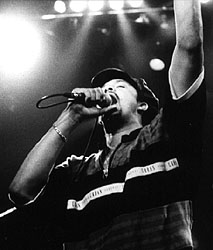|
Taken from sfweekly.com (February, 2001)
This Year's Model
Hip hop pioneer takes a fresh approach
by Lisa Crovo
Photo by Dan Dion
 On a rainy Thursday night in early February I made my way over to the Secret Studios building off Third St. in San Francisco to chat with Michael Franti, the passionate, poetic soul behind the rootsy, hip-hop jam band Spearhead. On a rainy Thursday night in early February I made my way over to the Secret Studios building off Third St. in San Francisco to chat with Michael Franti, the passionate, poetic soul behind the rootsy, hip-hop jam band Spearhead.
Navigating through the narrow maze of hallways reminded me of a college dorm. Music blared -- heavy metal throbbed behind one institutional-looking door, lilting reggae tempos drifted from another, somewhere down the hall a raunchy blues jam smoldered. People lingered in the lobby or smoked outside, colored flyers plastered the walls announcing upcoming shows and equipment for sale, and there was a sense of haphazard community­working musicians in their cubes, doing their thing.
The striking, dreadlocked Franti is nothing if not a master multi-tasker. Balancing a life of writing, recording, managing his label (Boo Boo Wax), touring and spoken word engagements, he is also a husband and father who attends basketball games, and engages in his favorite sport -- snowboarding. From the moment he enters the studio, he's all action. He simultaneously re-mixes a funky club version of "Rock the Nation" ("Fuck the Constitution/Are we part of the solution or are we part of the pollution?), eats dinner (mixed salad, tofu and rice), visits with friends (Marco, owner of the Baobab, a Mission caf? where Franti recorded a live album last year), coordinates tour details with his manager, and conducts a phone interview with a radio station in Ukiah. Two days later he'll be there kicking off his tour at the Event of the Heart HIV/AIDS Benefit, but right now the priority is to get the club mix right.
I asked why he left Columbia, a major label he had been with for the past few years, to strike out on his own.
MF: I felt that for what I do it wasn't the right business model. Major labels are really good at putting out 100 records and hoping that two hit. Out of 20,000 records that come out every year only 2% sell over 25,000 units. A band like mine that has never sold millions of records, but manages over the years to sell 300,000, I consider pretty amazing -- but to a major label, it's nothing. I felt there had to be a way for someone not to have to have to sell millions of records, yet still turn a profit, and finance a band and a living.
LC: How have you been able to do it on your own?
MF: We keep costs down. We don't rent a huge studio, we do everything here. Also, if we put out boutique records and only plan to sell ten to thirty thousand, we can do a lot of that by selling CDs at shows. At a major record label, an artist goes into debt -- a couple hundred thousand dollars to get started recording, up to a million after you shoot a few videos.
LC: You sell a lot at shows, but what about when you're not touring? How do you get distribution?
MF: We definitely want to be serviced in stores, it helps profile the band. We teamed up with 76 Degrees, which is a larger San Francisco independent label. They're distributed by Ryko, so we can make sure we get in all the stores. Worldwide, we just started dealing with Virgin. Of course, there's now a cut taken by both companies, so the profit margin is smaller, but we're getting our stuff out there.
It's a new model for artists to begin looking at -- if you can sell records you made inexpensively, you don't need to sell as many to make a profit. It enables you to put more records out more often. Sell them at shows and tour to generate a sustainable income.
LC: The music scene here has taken a beating recently; what are your thoughts about it?
MF: I'm kind of glad that George Bush is in office, cause I'm hoping it will signal a dramatic downturn in the economy which will be good for Bay Area musicians (laughs). I think the real message is that you have to keep that do-it-yourself attitude. You never know when the rug's going to be pulled out from under you. People should remember this isn't the first time artists have lost their spaces. You have to move on and adapt, it's a cycle of growth. I think it inspires renewed energy. Don't fear it.
LC: Are you hopeful about the future of the SF music scene?
MF: I am hopeful, because I see that the music is still good. Bands are still filling up clubs every night. I'm really inspired by a lot of electronic music that's going on here. I see the importance of bridging a gap between live and electronic music. We need that unity now.
While Michael Franti remains hopeful, the future of his work space is uncertain. The lease on the building expires this year, and it's not clear if the owners will renew. More than a hundred bands rehearse here, and Franti is rejuvinated by these surroundings.
"Every day I'm inspired when I walk down the hall here," he says a bit wistfully, "It's a great creative place to be."
|